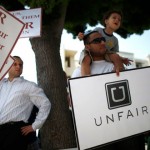 The lot of gig economy drivers at firms like Uber and Lyft were put into the spotlight with the release of Uberland by Alex Rosenblat. Whilst it’s perhaps a stretch to say that the strikes from drivers at both firms is a direct response to the book, there is a sense that the driving community are willing to push back against conditions they regard as unfair.
The lot of gig economy drivers at firms like Uber and Lyft were put into the spotlight with the release of Uberland by Alex Rosenblat. Whilst it’s perhaps a stretch to say that the strikes from drivers at both firms is a direct response to the book, there is a sense that the driving community are willing to push back against conditions they regard as unfair.
The question is, will the strikes prove effective? That was a question that recent research from Rice University attempted to answer. The striking drivers are looking for a minimum wage of around $28 an hour, which after expenses are deducted would give them a take home of around $17 an hour.
“Uber and Lyft are unlikely to increase drivers’ minimum wage to $28 simply because of the May 8 strike,” the authors say. “The success of their business models attributes, in a large part, to the independent contractor classification of their drivers.”
New masters
The authors believe that far more likely is an offer for a one-time bonus, as despite the crazily high valuation Uber commands, it’s still losing huge sums of money, with a $1 billion loss reported in 2018. After the company goes public the pressure from investors is likely to intensify, so it’s unlikely that the purse strings will be loosened.
Instead, the authors believe that the drivers are much more likely to get their way if they go through the legislative process, but this is by no means a quick affair, with Lyft engaged in a lengthy legal battle against New York City.
“It is potentially inspired by the success of New York City’s driver minimum wage law enacted recently $27.86 gross and $17.22 after fees and expenses and the timing of Uber’s impending IPO,” they explain. “The fundamental issue is that the drivers are classified as independent contractors instead of employees, a position Uber defended fiercely in court.”
Such classification is enough to save companies up to 30% due to things such as overtime pay, benefits and social security not being legal obligations. For drivers however, such an arrangement still saddles them with a full tax bill but they also have to foot the maintenance costs of their vehicle and other expenses, such as healthcare. Whether the flexibility they get is sufficient compensation is something that only time will tell, but you suspect Uber is ultimately striving for a world where they don’t require drivers at all, so however things shake out, it seems a battle that drivers will ultimately lose.